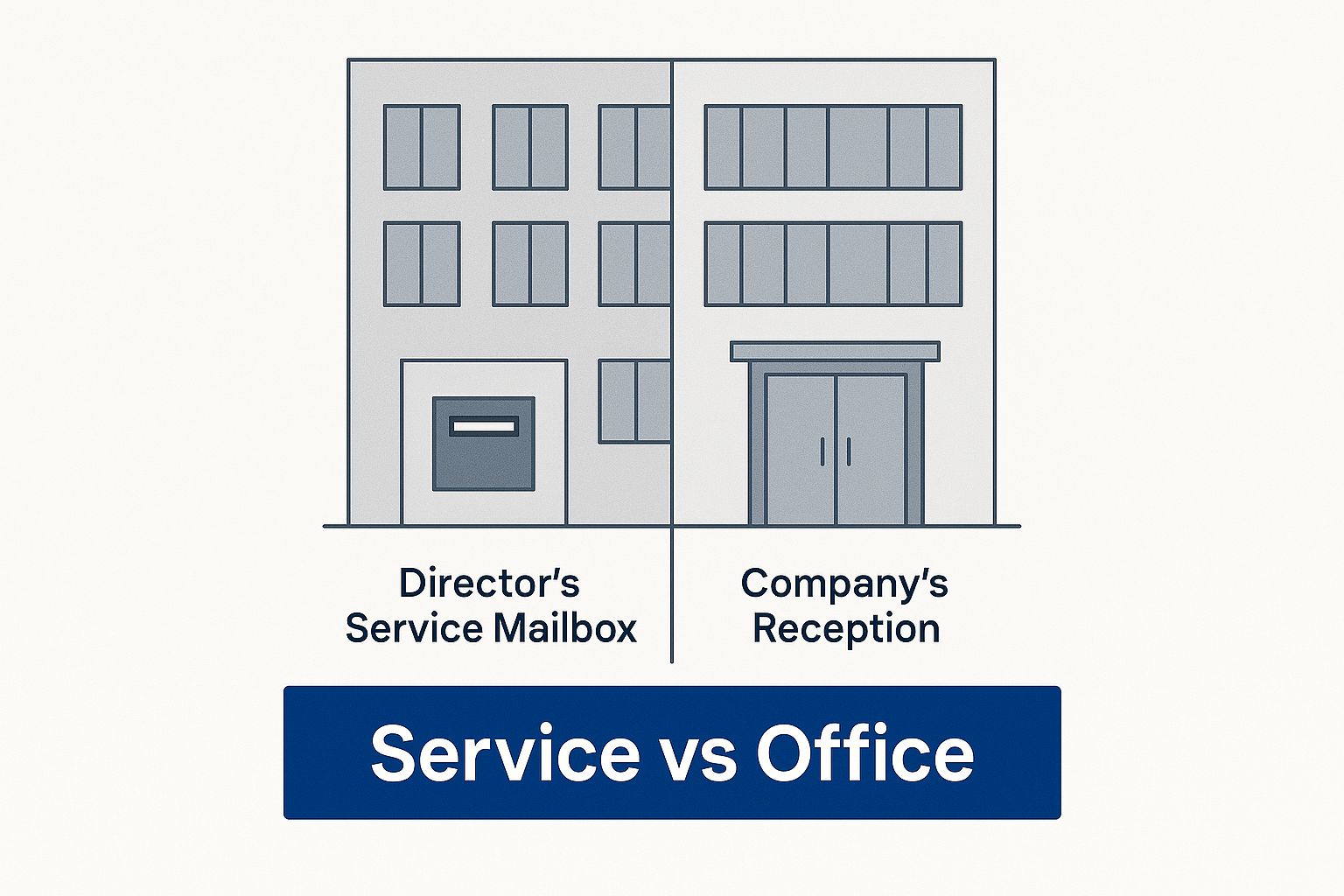Your Guide to a Director Service Address
When you set up a limited company in the UK, you’ll quickly come across the term director service address. So, what is it exactly?
Put simply, it’s the official, public-facing correspondence address for a company director. It’s where official bodies like Companies House and HMRC will send any statutory notices and legal documents. Most importantly, this address is listed on the public record for all to see.
What a Director Service Address Really Means
Think of a director service address as a professional shield for your personal life. As a UK company director, you’re legally required to provide an official address where you can be contacted. That address then becomes public information, easily searchable on the Companies House register.
Now, you could use your home address. Many new directors do. But this means your private residential address is completely exposed to clients, suppliers, marketing agencies, and frankly, anyone who cares to look it up. This often leads to a pile of junk mail, the risk of unsolicited visits, and a serious erosion of your personal privacy.
For instance, a freelance consultant using their home address might find themselves fielding unexpected visits from salespeople or even disgruntled former clients, blurring the line between home and work. A dedicated director service address is the simple, effective way to prevent this.
The Core Purpose Explained
The main job of a service address is to create a clear, clean line between your professional duties and your private life. It allows you to meet your legal obligations without putting your personal security on the line—a massive plus for anyone running a business from home.
By law, every UK company director, company secretary, and Person with Significant Control (PSC) must provide a service address. Critically, it has to be a physical location where official mail can be reliably received. A standard PO Box number just won’t cut it.
This is where using a professional service address provider comes in. It gives you a legitimate, often prestigious, commercial address to put on the public record, keeping your home address safely out of sight.
Not only does this protect your privacy, but it also instantly boosts your company’s professional image. It’s a straightforward way to fulfil your legal duties while keeping that all-important boundary between your business and home life intact.
Staying on the Right Side of the Law
Getting your head around the legal rules for a director service address is actually pretty straightforward. It all boils down to the UK’s Companies Act 2006, which requires every company director to have an official address on the public record. Think of it as a reliable postbox for important, official mail from government bodies like Companies House and HMRC.
The main rule is simple: the address has to be a real, physical location. This means someone must be able to deliver mail there and, if needed, get a signature. Your accountant’s office is a classic example, as is an address from a dedicated provider. What doesn’t work? A standard PO Box number. That’s a no-go because it isn’t a physical place where legal documents can be officially served.
What Counts as a Compliant Address?
For your director service address to be legally sound, it needs to tick a few boxes. It’s not just about having a letterbox; it’s about making sure crucial communications will definitely reach you.
A compliant address must be:
- A full, physical postal address where mail can be delivered without a hitch.
- Ready to receive official government mail from agencies like HMRC.
- Accessible for the delivery of legal documents that might need to be signed for.
Getting this wrong isn’t just a minor admin headache. The consequences can be serious, ranging from fines to worse.
Companies House has the power to act against companies that fail to maintain a compliant service address. In the most severe cases, this could lead to the company being struck off the register and dissolved completely.
How New Laws Are Changing the Game
The legal landscape is always shifting to find a better balance between corporate transparency and personal privacy. The Economic Crime and Corporate Transparency Act 2023 is a big step in this direction, and it makes using a separate director service address more valuable than ever. The Act is all about cleaning up the company register and protecting individuals’ private data.
One of the most important changes is that, from January 2025, directors can apply to have their home addresses scrubbed from historical public records if they were previously used for business. This signals a clear shift towards greater director privacy, making a professional service address an essential tool for keeping your home and work lives completely separate. You can find out more about how these Companies House changes impact directors on bronsens.co.uk.
Service Address vs Registered Office Address
When you’re setting up a new company, it’s easy to get tangled up in the terminology. One of the most common trip-ups for new business owners is the difference between a director service address and a registered office address. They might sound similar, but they do two completely different jobs.
Getting them mixed up isn’t just a bit of admin hassle; it can lead to real privacy headaches down the road.
Think of it this way: the registered office is the official, public home of your company. The service address, on the other hand, is the official mailbox for you, the director. Your company and you are separate legal entities, and the law needs a distinct point of contact for each one.
Did you know? The Registered Office Service from Acorn Business Solutions includes the directors service address free of charge for all officers of your company

The bottom line is that post meant for the business as a whole needs to go to a different place than official letters meant for a director personally.
The Company’s Official Home
Your registered office address is the formal, public address for your limited company. This is where all official letters and notices for the business itself—from Companies House, HMRC, and other government bodies—will land.
It has to be a physical address in the same part of the UK where your company is registered (for example, England and Wales, Scotland, or Northern Ireland). This address is displayed on the public record for anyone to see and must also be printed on all your company letterheads, your website, and invoices. To get the full picture, you can learn more about what is a registered office and all its legal requirements.
The Director’s Official Mailbox
In complete contrast, a director service address is a personal requirement for the individual director (or company secretary, or Person with Significant Control). This is the address official bodies use to send correspondence directly to you about your duties, responsibilities, and legal obligations as a director.
Crucially, this address can be anywhere in the world; it doesn’t have to be in the UK. This flexibility is a huge reason why so many directors choose a professional service address—it keeps their home address off the public register and protects their privacy.
The core difference is simple: a registered office is for the company; a service address is for the director. One handles corporate mail, the other handles personal director-related mail.
To make the distinction absolutely clear, here’s a side-by-side comparison of what sets them apart.
Director Service Address vs Registered Office Address
| Attribute | Director Service Address | Registered Office Address |
|---|---|---|
| Who It’s For | The individual director, secretary, or PSC. | The limited company as a legal entity. |
| Purpose | To receive official mail for the director. | To receive official mail for the company. |
| Public Record | Yes, it is publicly visible. | Yes, it is publicly visible. |
| Location Rules | Can be anywhere in the world. | Must be in the UK jurisdiction of registration. |
| Typical Mail | Notices about director duties, legal filings. | Statutory mail, legal notices for the company. |
As you can see, while both are public, their purpose and location rules are fundamentally different. Understanding this distinction is one of the first and most important steps in setting up your company correctly and protecting your personal information from day one.
The Real Benefits of a Professional Address
Choosing a professional director service address is much more than just ticking a box on a form; it’s a strategic move with some serious upsides. While it certainly keeps you compliant with the law, its real value is in the layers of privacy, credibility, and simple, everyday convenience it adds to your life as a director. Think of it less as an expense and more as a smart investment in your company’s image and your own peace of mind.
The biggest and most immediate win? Protecting your personal privacy. When you use your home address as a director, that information is published on the public record at Companies House for anyone to see. This opens your front door, digitally speaking, to everyone from curious clients and suppliers to data scrapers and marketers, often leading to a flood of junk mail and even the risk of someone showing up unannounced.
Strengthen Your Professional Image
Beyond keeping your home life private, a professional address gives your business an instant credibility boost. Picture a potential high-value client doing their homework on your company. What looks better? A residential address in the suburbs or a respected commercial address in a known business district? It immediately projects an image of stability and professionalism.
For start-ups and home-based businesses trying to build trust, this small detail can be a game-changer. It suggests you’re an established, serious operation. Using that same commercial address everywhere—on your website, invoices, and official registries—builds a consistent and trustworthy brand.
Secure Your Privacy and Personal Safety
A director service address acts as a crucial shield between your public role as a director and your private life. By keeping your home address off the public register, you neatly sidestep several risks.
- Prevent Unwanted Mail: Your home letterbox won’t be clogged with business-related flyers, brochures, and other junk mail.
- Avoid Unsolicited Visitors: It stops disgruntled customers, overeager salespeople, or anyone else from turning up at your family home.
- Reduce Identity Theft Risk: The less personal information you have floating around in the public domain, the lower your exposure to fraud.
In short, a professional service address creates a secure buffer zone. It lets you meet all your legal duties as a director without sacrificing the safety and privacy of your home and family.
Enjoy Unmatched Convenience and Reliability
Finally, you really can’t overstate the sheer convenience of a professional address service. These services are set up to handle official mail from places like Companies House and HMRC with total efficiency. You’ll never miss a critical notice, no matter where you’re working from.
Most providers will forward your mail, scan it, and upload it to a secure portal, giving you instant access to important documents. For example, a director travelling for business could receive a scanned, time-sensitive notice from Companies House via email and act on it immediately, avoiding late filing penalties. This kind of reliability is vital. Many providers also offer a virtual mailing address, which can handle all your general business mail too, putting everything in one streamlined, easy-to-manage place. It lets you get on with what you do best—running your business.
How to Set Up Your Director Service Address
Getting your director service address sorted is a pretty straightforward job, but doing it right the first time will save you a world of headaches later on. The process is simple: pick a provider you trust, then pop a quick notification over to Companies House. It’s a crucial step for protecting your personal privacy and giving your business a professional footing from the get-go.

Your first move is to choose a service provider that actually fits your needs. This isn’t about just grabbing the cheapest deal you can find; it’s about finding a partner you can rely on to handle official, often time-sensitive, correspondence.
Choosing the Right Provider
Think of it like hiring a professional assistant just for your mail. You need someone who is reliable, efficient, and completely transparent about what they offer.
Here’s an actionable checklist of what to look for:
- Mail Handling Options: Do they just forward your post, or do they offer a slick ‘scan-and-email’ service? Getting digital copies can be a lifesaver for urgent documents. Acorn Business Solutions offers a range of mail handling options
- Transparent Costs: Are there any sneaky hidden fees for forwarding mail or handling parcels? A reputable provider will lay out their pricing clearly and upfront. Acorn Business Solutions have clear an open pricing across all services.
- Permission to Use: Make sure you get written confirmation that you are authorised to use their address. You’ll need this for your records. Acorn Business Solutions will provide written permission to use its address.
Once you’ve found your provider and have their address in hand, the next step is to make it official with Companies House.
Filing the Correct Forms with Companies House
How you register your director service address depends on whether you’re starting a new company from scratch or just updating the details for an existing one.
For a brand-new business, you’ll use Form IN01 as part of the company formation process. This one form covers everything, including appointing your directors and listing their service addresses. It’s the cleanest way to get everything set up correctly right from day one.
If you’re already a director and just need to change your address, you’ll need to file Form CH01 (Change of director’s details). This form lets Companies House know about the update. You have to get this done within 14 days of the change, otherwise you could face penalties, so don’t put it off. For a smooth transition, check out our detailed advice on how to manage a Companies House change of registered address.
A quick pro tip: Always, always get written permission from your service provider before you register their address with Companies House. This confirmation is vital proof that you are authorised to use it.
The whole concept of a director’s service address is a core part of UK company law, designed specifically to help directors maintain their privacy. Since directors have to give Companies House both a service address and their residential address, this system allows them to keep their home details off the public record. It’s a key feature of the Companies Act 2006, and it’s precisely why choosing and setting up your service address correctly is such an important step.
Common Mistakes to Avoid When Setting Up a Director Service Address
Getting your director service address set up is usually straightforward, but a few common slip-ups can cause some serious headaches later on. Steering clear of these pitfalls is the key to staying compliant and protecting your privacy without any drama.
The most common mistake we see is directors simply forgetting to tell Companies House they’ve changed their address. You’re legally required to file a Form CH01 within 14 days of the change. Miss that deadline, and you could be facing fines. More importantly, it means crucial legal documents will be sent to the wrong place.
Choosing the Wrong Type of Address
Another classic error is picking a non-compliant address right from the start. There’s a common myth that any old mailbox will do the trick, but that couldn’t be further from the truth and can land you in hot water.
Make sure you avoid these options:
- Standard PO Box Numbers: These are a definite no-go. Companies House won’t accept them because they aren’t considered a physical address where legal documents can be officially served.
- Unreliable Mail Forwarding Services: Going for a cheap but disorganised service can be a total disaster. Just imagine a final reminder from HMRC getting lost in the post, leading to penalties you never even saw coming – all because your mail wasn’t handled properly.
It’s vital to choose a provider who not only gives you a compliant physical address but also has a solid reputation for handling mail reliably and on time. At the end of the day, a lost document is your responsibility, not theirs.
Forgetting to Notify Everyone Else
Finally, it’s surprisingly easy to overlook updating all the necessary parties. While Companies House should be at the top of your list, you also need to inform HMRC, your business bank, and update any public-facing materials like your website or company letterhead.
Think about it like this: Sarah, a freelance consultant, moves her director service address but only updates Companies House. A few months down the line, her business bank freezes her account because they’ve had mail returned from her old address. Suddenly, she’s facing a massive operational crisis. This simple scenario shows just how important it is to have a comprehensive update process. A quick checklist can prevent these easily avoidable, but incredibly disruptive, problems.
Frequently Asked Questions
When you’re sorting out your company’s official details, a few common questions about the director service address always pop up. Let’s clear up some of the most frequent queries we hear.
Can I Use My Accountant’s Office?
Yes, you certainly can. Using your accountant’s or solicitor’s office is a brilliant move. It’s a professional, physical location that can reliably handle official mail, ticking all the legal boxes while giving your business a more established look.
Just be sure to get their permission in writing before you list their address with Companies House.
Is My Service Address Publicly Visible?
It is, yes. Your service address becomes part of the public record for your company. This means anyone can search for your business on the Companies House register and see the address listed for you as a director.
This is the very reason so many directors opt for a professional address service. It keeps their home address private and ensures the one on display is a proper commercial one.
Do I Need to Change It If I Move House?
This is a great question and a key point of confusion. You only have to update your director service address with Companies House if that specific address changes.
So, if you’re using a professional provider for your service address and you move house, you don’t need to do a thing. Your service address remains the same. The only address you’d need to update is your private residential address, which Companies House keeps confidential. This is a huge practical benefit of using a separate service address.
A secure and compliant director service address is a cornerstone of good business practice. Acorn Business Solutions offers reliable address services to protect your privacy and project a professional image. Set up your address with confidence at https://acornbusinesssolutions.com.






